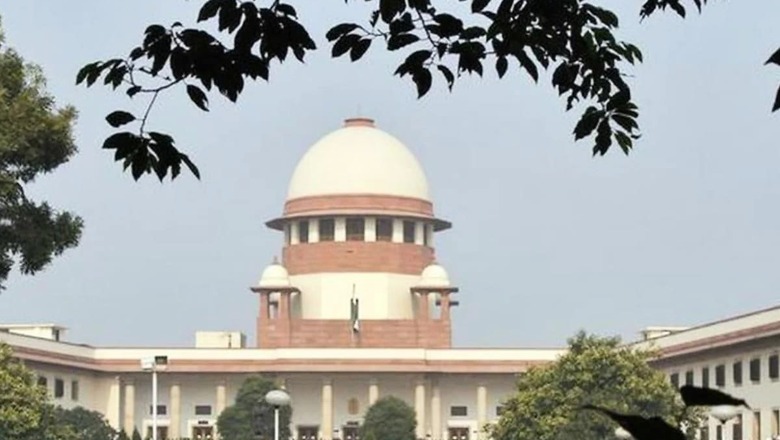Plea in SC Against Hindu Succession Law on Gender Discrimination; Court Says Will Like HC View First

views
The Supreme Court Monday said it would like to have the benefit of high court order on a plea filed by a woman challenging Constitutional validity of section 15 of the Hindu Succession Act, on the ground that its provisions discriminate solely on the ground of gender. The petitioner said the scheme of the Act is such that upon the intestate death of a female Hindu, the husband’s family (including his extended family) has a stronger claim to her property than the wife’s family, even in cases where the wife may have acquired the property through her own skill or effort.
The petitioner, whose childless daughter and son-in-law died due to COVID without making any will, has further stated that the provisions under the law provide differential treatment to the mothers of a man and a woman as only the latter’s children, husband and in-laws have the first right to inherit her property. The parents of the deceased daughter are given such a right only after the parents and even the distant relations of the man.
A bench of Justices S Abdul Nazeer and Krishna Murari said the court understands the provision but it would like to have a benefit of the High Court order. During the hearing of the plea, the bench asked advocate Sumeer Sodhi, appearing for petitioner Manju Narayan Nathan, as to why this petition be entertained under Article 32 of the Constitution.
We are dealing with section 15 of the Act day in and day out but why should we entertain a petition under Article 32. Why can’t you go to the High Court, so that we can also have the benefit of the view taken by the High Court, the bench said. Sodhi replied that the present issue impacts every Hindu women in the Country, and has far reaching ramifications.
Trying to persuade the bench, Sodhi said that he has moved under Article 32, as discrimination under section 15 of the Act has been already recognised on three separate occasions. The discrimination in the provision has been recognised by the Bombay High Court in 2012. Further, the discrimination has also been brought to light before the Parliament in the Hindu Succession Amendment Bill, 2015 and even the Law Commission in its 207th report has recommended the amendment of the provision to remove the patent discrimination in the provision, he said.
The bench said that it agrees that the issue may require consideration but since Section 15 of the Hindu Succession Act is an old provision, it would like to have the benefit of the High Court’s opinion in the matter. Sodhi then sought permission of the court to withdraw the plea to which the bench agreed, while giving him liberty to approach the High Court.
The plea filed through advocate Shreya Nair said that it has assailed the Constitutional validity of Section 15 of the Hindu Succession Act, 1956 on the ground that the same is ultra vires as it is violative of Article 14 and 15 of the Constitution of India, and is liable to be struck down. The petitioner Manju Narayan Nathan said the basis of challenge to Section 15 of the Hindu Succession Act is discrimination on the basis of sex.
She said that bare perusal of provisions of Hindu Succession Act, 1956 evinces that it lays down different rules for the devolution of properties of males and females. Her plea said that in fact under Section 15 (1) the property of a female Hindu would only devolve upon her parents if she has no living husband, sons and daughters and there are no heirs of the husband. In practice however the property will likely never devolve on a female Hindu’s parents, as the list of the husband’s heirs is so exhaustive. There is no such provision when it comes to the devolution of a Hindu Male’s property, it added. The petition further said that the law was enacted with an aim to ensure that any property that devolved on a woman through her husband would be reverted to the husband’s heirs on her demise but such a scenario precludes any consideration of property that a woman acquires through exercise of her own skills. It said there are scenarios where upon the death of a Hindu female, intestate and childless and with no surviving husband unrelated distant relatives of the husband’s family have a stronger claim to the Hindu woman’s property than her own natal family.
Per contra if a Hindu Male dies intestate and childless leaving behind no surviving wife, his mother has the highest priority of succession followed by his father’s and siblings, distant relatives etc., however his wife’s natal family has no claim to the property, Nathan said. The petitioner said that her daughter was married on February 25, 2007 and she was an independent woman with her own income and self-acquired property. She said that during the second wave of COVID -19, the couple was tested positive and eventually succumbed to the virus in April and May, 2021.
Her son-in-law passed away on April 24, while her daughter passed away on May 1, without any children. The woman claimed that in accordance with Section 15 of the Act, even her daughter’s self-acquired property, moveable and immoveable, amounting to approximately Rs. 2.7 crore (as per the information available to her from various sources) will devolve upon the only surviving heirs of her husband, despite the fact that her entire property is self-acquired.
.
Read all the Latest News, Breaking News and Coronavirus News here.













Comments
0 comment